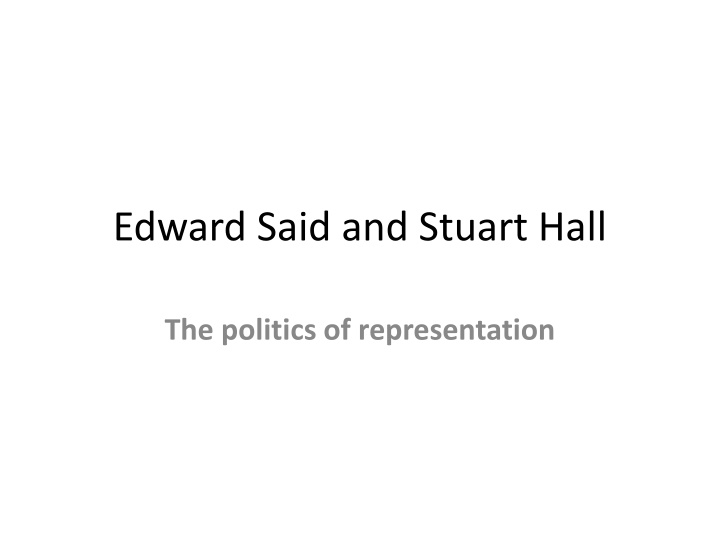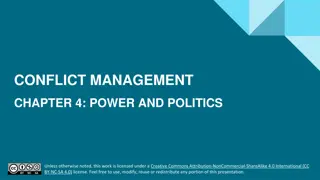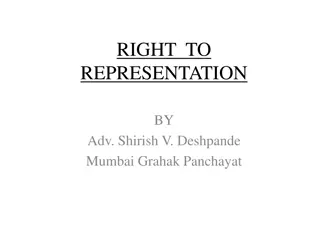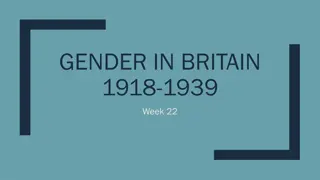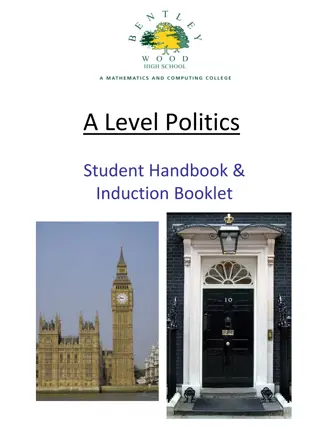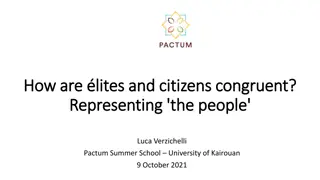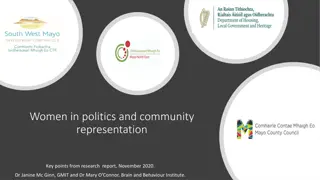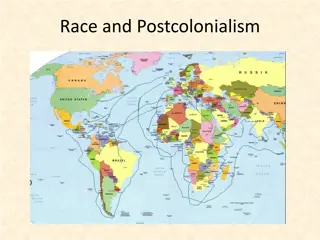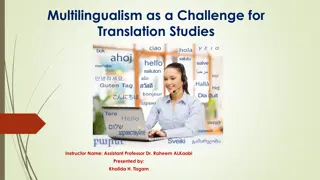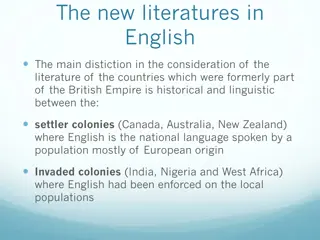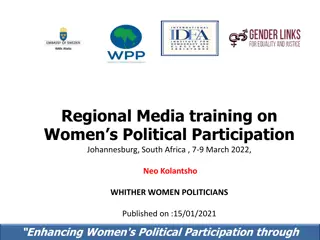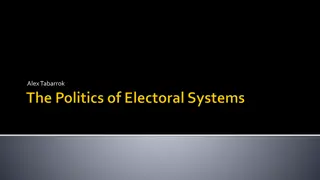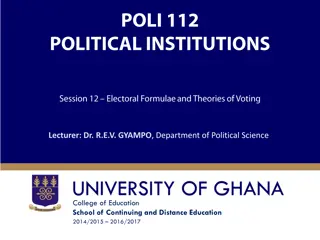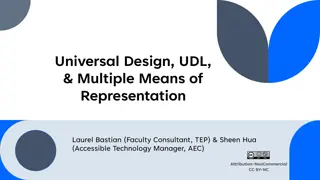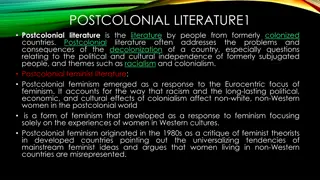The Politics of Representation in Postcolonial Studies
An exploration of the power of texts, literary criticism, and Orientalism as discourse, focusing on Edward Said and Stuart Hall's contributions. The discussion delves into how texts shape our understanding of the world and the implications of Orientalist representations on the East. The analysis highlights the role of discourse in constructing reality and the dynamics of power and knowledge in shaping perceptions.
Download Presentation

Please find below an Image/Link to download the presentation.
The content on the website is provided AS IS for your information and personal use only. It may not be sold, licensed, or shared on other websites without obtaining consent from the author.If you encounter any issues during the download, it is possible that the publisher has removed the file from their server.
You are allowed to download the files provided on this website for personal or commercial use, subject to the condition that they are used lawfully. All files are the property of their respective owners.
The content on the website is provided AS IS for your information and personal use only. It may not be sold, licensed, or shared on other websites without obtaining consent from the author.
E N D
Presentation Transcript
Edward Said and Stuart Hall The politics of representation
Power of texts texts (literary, visual) inform our view of the world, esp. of a world we don t know or of which we don t have first-hand knowledge power of texts lies in their implicit claims of authoritative knowledge and expertise texts create not only knowledge and but come to constitute our reality through their power of description Cf. Michel Foucault s theory of discourse an amalgam of written and spoken language and social practices that describe and in doing so create or conjure social reality
Literary Criticism Making criticism relevant to the world Examining the critical gap between texts and reality Assessing the ideology of texts/novels: reading critically involves assessing the imaginative relationship to reality that texts construct
Orientalism as Discourse Said is best known for his work on Orientalism, in which he describes Orientalism as a) a system of representation of the East/Orient; b) a repertoire of images and attitudes and ways of seeing consisting of recurrent stereotypes within Orientalist writing in the West But there are also contradictions in that representation--East: both attractive and repulsive
Some characteristics of Orientalism --an irreconcilable difference between East and West (the myth of the clash of civilizations after the end of the Cold War); --an unchanging Orient, static, free from history, primitive and barbaric; -- living tableau of queerness --voluptuous women, snake-charmers, world of ease and languor, wine and song; but also despotism, perversions, dangers, women locked up in harems (375); --Lack of sense of law; irrational; --unchanging essence: the Arab mind; the Islamic worldview; the opposite of modern
Power/Knowledge Orientalism as discourse then helps create the conditions or participates in the domination of the Orient by the West Creation of a general interest and fascination for the Orient a field of vision, a way of seeing and looking at the Orient the scope of Orientalism exactly matched the scope of empire (376) the Orient/East became the object of knowledge, silent and passive, and the West became the realm of the subject, of the knower/representer. Representation is thus ultimately about power in society who gets to represent whom and how and why and from where. Youtube: edward said orientalism 1/4
Is Orientalism racist? Historical, cultural and racial generalizations Emphasis on the past, on the classical period, not on the living character Denies the Orient any history; denies its presence, except as a fall Crucially, this power of representation is asymmetrical (cf. Kureishi s satirical take on modern Orientalists in 1960s/70s Britain)
Orientalisms Crisis when the West confronts disparity b/w texts and reality Anti-colonial and anti-racist rebellions Third world nationalisms and decolonization Global solidarity movements Alternative history: Haitian Revolution of the 18thc; independence movements in India and Africa, mid-20thc; ongoing struggles for Palestine
Stuart Hall, New Ethnicities Jamaican-born; one of the founding figures of the Birmingham-based Cultural Studies (Resistance through Rituals: Youth Sub- Cultures in Post-war Britain, 1977; The Hard Road to Renewal: Thatcherism and the Crisis of the Left, 1988)
The politics of representation Political activism and protest (in politics, literature, visual media) sought to engage and to alter the terms and relations of representation a) access to representation; b) contestation of the stereotype, for a more accurate portrayal
Black and British Politics of anti-racism and the post-war black experience Shift in the conception of black identity from the 1970s to the 1990s From unifying framework across differences (common experience of racism and marginalization) to a disaggregation of interests and identities difference and hybridity
Politics of difference Difference: not radical separation, but based on position/location/contingency Difference as relational https://www.youtube.com/watch?v=bMo2uiR Af30 (race as floating signifier)
articulation race has to be seen in historical articulation with other categories gender, ethnicity, sexuality, class, none of which have fixed meanings (that does not mean they are not real, but that they are not essential, they are not drawn from a black or a female or a gay essence)
Hanif Kureishis The Buddha of Suburbia questions of ethnicity: a) culturally constructed sense of Englishness b) non-coercive, more diverse conception of ethnicity c) splitting the notion of ethnicity: ethnicity of the margins d) we all speak from particular positions without being contained by it e) we are all ethnically located-- it is British racism s closed, exclusive and regressive form of identity so hegemonic, it does not represent an ethnicity at all
Kureishis art Diaspora experience of blackness cut and mix; hybridization Artistic experimentations Contestation over what it means to be British complexly mediated, transformed by memory, desire, fantasy In films such as My Beautiful Laundrette: 1980s Britain under Thatcher a refusal to represent black culture in Britain as monolithic, self- contained, sexually stabilized http://www.youtube.com/watch?v=iirxLSp-yB4
